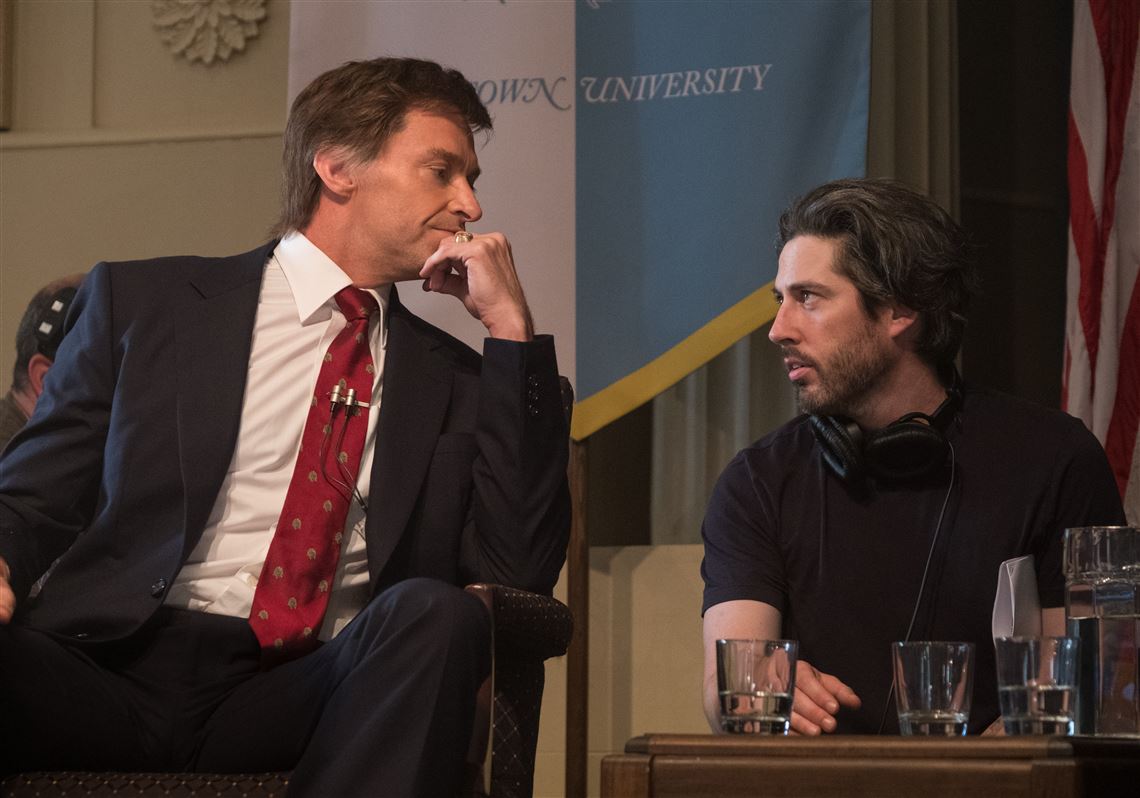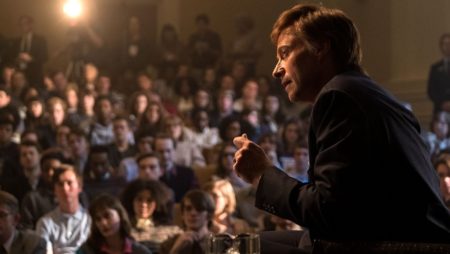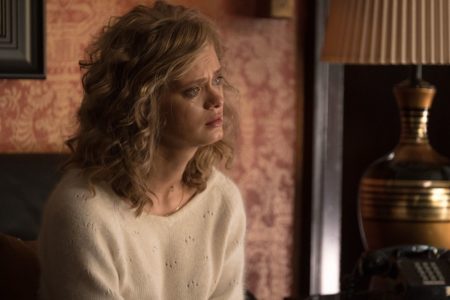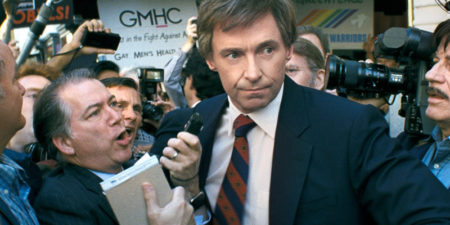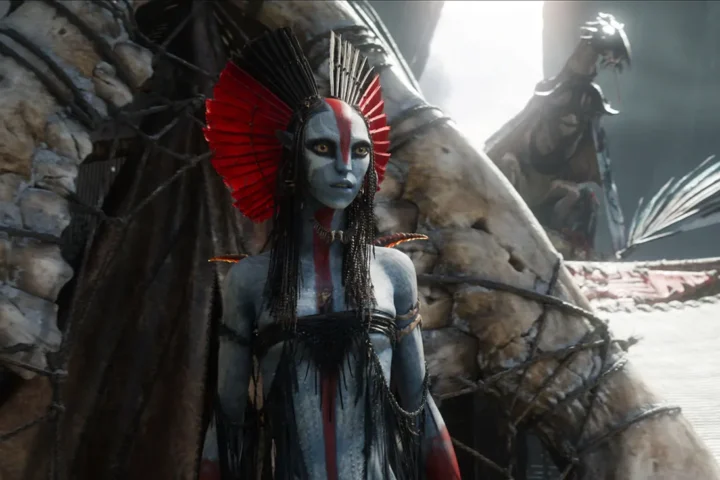In 1987, Colorado senator and surefire 1988 Democratic presidential nominee Gary Hart’s bright political future was handily extinguished by allegations of extramarital impropriety with Donna Rice—we’ve all seen the famous photo—and Hart went from popular man of the people to political pariah in a matter of a few short weeks.
Jason Reitman’s new drama The Front Runner navigates this spectacular fall from grace, with star Hugh Jackman channeling Hart’s charisma and tenuously close relationship with the press that would ultimately prove his undoing. In a movie about the rise of tabloid journalism in politics and a promising candidate undone by the ever-vanishing line between public and private, Reitman trains his lens on the diminishment and of both parties—Hart and Rice—by a voracious cycle of sensationalism.
I caught up with Reitman recently to chat about his movie, crafted with rigor and intelligence, historic yet informed by distinct contemporary zeitgeist as an examination of a moment in American culture where the ethics of candidate and journalist clashed, and a public ready to consume a scandal drove the outcome.
The Front Runner is a remarkably prescient movie in some regards, and one that has no real heroes or villains. Certainly what goes on in the film with the press is perhaps as ethically bankrupt as some might accuse Gary Hart of being.
I was, for the most part, unfamiliar with this story. When I told friends I was thinking about making it, everyone reacted differently. Certainly some people villainized Hart and some the press. There was no one way to look at the story. It was this perfect pH test where you had this guy who was a smart, capable, charismatic candidate with big, prescient ideas who simultaneously was a human being who clearly had flaws. And that set the table for the kind of conversations we are having in 2018, and we were able to talk about issues in a way we can’t anymore. It’s so shrill now. You can’t go onto Twitter without feeling like you are going to get your head ripped off. Somehow, through this 1987 story, we could talk about gender politics, the relationship between journalists and candidates and the line between public and private lives. That became a big reason I wanted to make this movie.
What does the film say about the media and the American public as consumers of information?
Over the last few years our mutual industries have gone through a huge shift in where we read and watch our news and how we watch movies. Everything has become clickable. The kind of conversation between the teller and the consumer has completely changed, and I think that has roots in this story. There is no one, specifically, to blame. But what Ben Bradlee says in the movie is interesting, about not being able to decide what is news anymore. If everybody else in the country is going to cover something, then The Washington Post apparently has to cover it as well. And if they are not deciding what is relevant news, who is?
This movie speaks to the moment in which tabloid journalism and political journalism drove into the same lane. And the question is whether they ever parted. It started with the cover of Time magazine and big picture of Gary Hart and a little photograph of Donna Rice. By the end it was a large photograph of Donna and a little photograph of Gary—two people who, in a private moment, suddenly found themselves in a public moment.
You met Gary Hart while making this film.
I reached out to Gary, his children, his campaign people and Donna Rice, and developed relationships with all of them. The idea was not to have them involved in the making of the movie because I never thought of this as a biopic, but rather a movie about a moment that involved not one but twenty main characters. I wanted to do the decent thing and say, ‘Hey, I’m the director and you can call me any time. If there is anything you wish to share that you think will add relevance to the movie, please tell me.’ We asked the campaign members what their favorite drinks were, what kind of cars they drove and their favorite sports teams; all kinds of stuff that found its way into the film.
And I’ve shown it to all of them. Donna was the first person who saw the film and that was very important to me. Of all the people in the film, I feel like she’s the greatest innocent. She’s this young woman who was ambitious and smart and the country treated her like an object. When I would tell people I was making this movie I would see them say, ‘Oh, Monkey Business. What was her name? What was the blonde’s name?’ I could see in the way they talked about her that they thought of her as an object. It was very important that we treat her as a human being. I knew the audience thought they were going to see this salacious movie, and when you meet Donna Rice in this movie you are looking at a human being whose life has been stolen.
Did Hart perhaps convey to you that he wished he hadn’t dropped out of the race so quickly?
No, no. He’s a man of character and stands by it. He doesn’t want to talk about it today and he didn’t want to talk about it then.
The screenplay is ambitious in giving voice to several characters. I also understand there was improvisation across the cast to capture a particularly expansive feeling.
We made an early decision to bring every cast member every day. If you were in Atlanta when we were shooting, you were on set. We were going to put you in costume, hair and make-up and put a wire (microphone) on you. Usually you only wire the actors who are talking, but we wired everybody. There was a script and dialogue, but also scenes we would write that were not in the script. (For example), we would give (an actor) a magazine from 1987 and say ‘Read this article and now tell him about it. That’s your dialogue.’ And it became the job of our sound mixer to keep control over that. (In mixing), he had 12, 15, 20 tracks all up and was adjusting the levels to point attention with your ears. Most movies point you where to look with your eyes; this movie points you with your ears. It’s a movie where you are hearing three conversations at once. You are forced to ask yourself what is important and what you should be listening to. It’s the philosophical question of the movie—what is relevant?
That sounds like an approach Robert Altman would take.
He was clearly a huge influence on the film as was Michael Ritchie with The Candidate.
If we were to look across your movies, we could say that you have strong women in all them. Sometimes you’ve even been called a filmmaker who evangelizes such women, whether in Juno, Tully, Labor Day or several others. So when you think about the many characters in this movie, what struck me was the agency of four of those women. Certainly Vera Farmiga is given her due as Hart’s wife, Lee. Ari Graynor has a great scene where she talks about the responsibility of men in power with women. Molly Ephraim is very protective of Donna Rice and displays real conscience. And then Donna herself, especially in the scene between Sarah Paxton and J.K. Simmons, has a lot of substance. I thought the writing of those women was quite interesting and I’d like to hear a bit about that.
Certainly. I’ve worked with the same producer since Up in the Air. Her name is Helen Estabrook and she is one of the smartest human beings I’ve ever met. She went to Harvard when she was sixteen and has a brain the size of Texas. Early on, she started challenging me on the way I make movies and what the discussion was about women in the films. You can feel that in the conversations with Anna Kendrick and Vera Farmiga in Up in the Air and you can kind of see it throughout all my work. I’ve been fortunate that I’ve worked with a lot of strong, smart women from Diablo Cody to Charlize Theron. But I think it’s that relationship with Helen. And when it came to this movie specifically, her mind was that I needed to remember the responsibility and the burden that falls upon the shoulders of women in the midst of a scandal, which is completely different from the burden that falls on the shoulders of men.
It became very important to explore that relationship between a young woman on the campaign and a young woman at the newspaper who are kind of put into that position of having to speak for their entire gender. And what happens when you are on a campaign and your whole livelihood has become a sacrifice for the sake of this candidate, and you give up everything because all you want is to get this person elected to president…and what happens when his flaws become relevant? And how do you relate to this woman, Donna Rice, being cast aside? This is a very frenetic movie where twenty people are talking at the same time. It’s meant to feel real and as if you were just dropped onto the campaign trail. But the movie stops twice—when you meet Donna Rice, the camera stops and goes quiet and you meet this young woman whose life has been torn out of her hands; and it stops when Vera Farmiga walks in the hotel room to talk to (her husband) about what has happened. And that’s not an accident.
This is a very committed performance from Hugh Jackman, who has said he didn’t know anything about Hart prior.
Hugh Jackman researches harder than any actor I’ve ever met. He had five notebooks of information. He knew speeches and talking points that were not in the movie. We would put him in press conferences and he didn’t know where the questions were going to come from. He learned to throw an axe, so he could throw a bullseye on the first take! He’s incomparable when it comes to his devotion to getting it right.
What’s different about a candidate like Gary Hart than perhaps those we often feel forced to choose between today?
We’ve come to a point where almost every candidate is willing to say whatever we want to get elected—lie, flip flop, ignore what they said a week ago, their voting record doesn’t seem to matter anymore. And Gary Hart was a guy who was saying ‘No, I’m not going to have this conversation.’ And went from the front runner to leaving politics forever in less than a week. That is the crazy thing to remember about this story. It happens in less than a week. We dismiss this guy and he just becomes a joke; a photograph; the name of a boat. And that was important to me—reexamining a very recent moment in history that has been forgotten and has all this relevance in the conversation we are trying to have today; the problems that we seem to be trying to solve today.
What’s your take on the biggest changes in how the press covers political campaigns from then to now?
They have become a circus. In 1987 journalists and candidates had relationships. They socialized together. They would eat together and go from drinks together. There was an understanding of what was public and what was private, and because of that journalists were given access to these candidates as human beings. And then as readers, we were given access to who they were as human beings. When this happened, a wall went up and it became the press secretary’s job to manage every moment of a candidate’s day and to make sure that the voters only got the most manicured moments, forcing journalists to become investigative journalists. To get any human details they had to penetrate this wall. So the wall is unfortunate. It would be better if we just had regular access because this paparazzi environment that we associate with Hollywood—and maybe Hollywood deserves it—became an environment that we associate with politics.
Do you believe this was a set-up? Does that change the story?
This question suddenly became more relevant in the last few weeks because of Lee Atwater’s deathbed confessional about having set up the Monkey Business. Perhaps he did. But at the end of the day I don’t think it matters. Perhaps this boat was put at that dock for a reason and Hart was brought to this party. At the end of the day he, met a girl and invited her to his townhouse in Washington, D.C. And we have to take that for what it is and decide whether or not it’s important.
The real question is not about Hart but about us. What do we care about? What’s important to us? Maybe it is important. I don’t know. It’s actually not for me to say. I don’t think this story was evaluated properly in 1987. I think it was turned into a tabloid comedy. It had all the right beats. It had good dialogue. It had a funny boat name. It had this picture. But at its core there was a more important story that wasn’t discussed. It was 1987 and there was the Tammy Faye Baker scandal, Oliver North and Fawn Hall, A Current Affair and a generation of journalist that had grown up watching Woodward and Bernstein. This happened at a crucial moment in our history when we had to decide for ourselves what was relevant and we kind of glossed past this one. I don’t blame (the press). They jumped on it for a reason. In the 1970s, the primary system was created, and it became the job of the journalists to tell us who the candidates were. As constituents, how were we supposed to know some governor from one state or congressman from another? It is the job of journalists to tell us who they are, but of course—what did we want to know?
What’s the best part about your job?
Everything about my job is amazing! I am so goddamned lucky! I get to work with the most talented people on Earth. I get to tell the type of stories I get to tell. And I get to live in the world of movies. And that’s something I dreamt about as a kid and did not think would come true. I thought I would always be compared with my father and never get this chance. And for some reason I get to tell these stories. I never stop being grateful for this opportunity.
